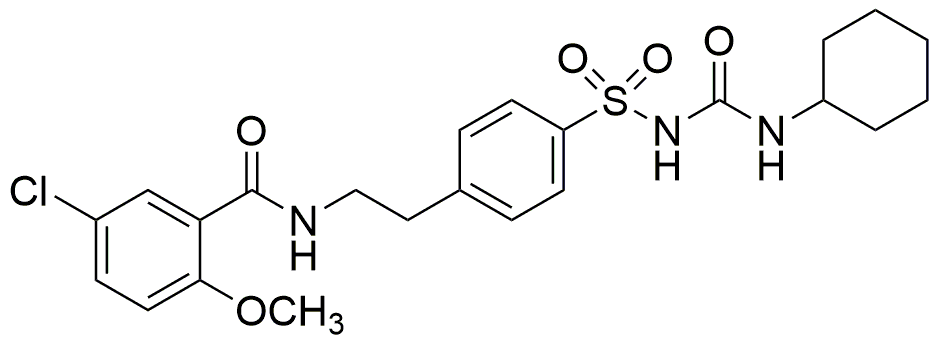Glibenclamide is widely utilized in research focused on:
- Diabetes Management: This compound is primarily used in the treatment of type 2 diabetes, helping to lower blood sugar levels by stimulating insulin release from the pancreas.
- Pharmaceutical Development: Researchers explore glibenclamide's efficacy in combination therapies, enhancing the effectiveness of other diabetes medications and improving patient outcomes.
- Clinical Trials: It serves as a key compound in clinical studies aimed at understanding the long-term effects of diabetes treatments, providing valuable data for future therapies.
- Drug Interaction Studies: Glibenclamide is often used to study interactions with other medications, helping to ensure safe and effective treatment plans for patients with multiple health conditions.
- Metabolic Research: In laboratory settings, it is utilized to investigate metabolic pathways and mechanisms of insulin resistance, contributing to the broader understanding of diabetes and related disorders.
General Information
Properties
Safety and Regulations
Applications
Glibenclamide is widely utilized in research focused on:
- Diabetes Management: This compound is primarily used in the treatment of type 2 diabetes, helping to lower blood sugar levels by stimulating insulin release from the pancreas.
- Pharmaceutical Development: Researchers explore glibenclamide's efficacy in combination therapies, enhancing the effectiveness of other diabetes medications and improving patient outcomes.
- Clinical Trials: It serves as a key compound in clinical studies aimed at understanding the long-term effects of diabetes treatments, providing valuable data for future therapies.
- Drug Interaction Studies: Glibenclamide is often used to study interactions with other medications, helping to ensure safe and effective treatment plans for patients with multiple health conditions.
- Metabolic Research: In laboratory settings, it is utilized to investigate metabolic pathways and mechanisms of insulin resistance, contributing to the broader understanding of diabetes and related disorders.
Documents
Safety Data Sheets (SDS)
The SDS provides comprehensive safety information on handling, storage, and disposal of the product.
Product Specification (PS)
The PS provides a comprehensive breakdown of the product’s properties, including chemical composition, physical state, purity, and storage requirements. It also details acceptable quality ranges and the product's intended applications.
Certificates of Analysis (COA)
Search for Certificates of Analysis (COA) by entering the products Lot Number. Lot and Batch Numbers can be found on a product’s label following the words ‘Lot’ or ‘Batch’.
Número de catálogo
Número de lote/lote
Certificates Of Origin (COO)
This COO confirms the country where the product was manufactured, and also details the materials and components used in it and whether it is derived from natural, synthetic, or other specific sources. This certificate may be required for customs, trade, and regulatory compliance.
Número de catálogo
Número de lote/lote
Safety Data Sheets (SDS)
The SDS provides comprehensive safety information on handling, storage, and disposal of the product.
DownloadProduct Specification (PS)
The PS provides a comprehensive breakdown of the product’s properties, including chemical composition, physical state, purity, and storage requirements. It also details acceptable quality ranges and the product's intended applications.
DownloadCertificates of Analysis (COA)
Search for Certificates of Analysis (COA) by entering the products Lot Number. Lot and Batch Numbers can be found on a product’s label following the words ‘Lot’ or ‘Batch’.
Número de catálogo
Número de lote/lote
Certificates Of Origin (COO)
This COO confirms the country where the product was manufactured, and also details the materials and components used in it and whether it is derived from natural, synthetic, or other specific sources. This certificate may be required for customs, trade, and regulatory compliance.

